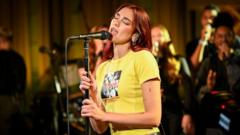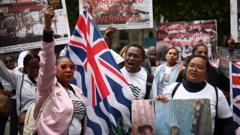Over 400 prominent UK musicians, writers, and artists, including Sir Elton John and Dua Lipa, have signed a letter requesting urgent updates to copyright laws to protect their works from being used in AI training without consent. The appeal comes as the government contemplates a range of measures in the face of rising concerns over the impact of generative AI on the creative industry.
Musicians Call For Stronger Copyright Protections Against AI

Musicians Call For Stronger Copyright Protections Against AI
British artists urge legislative changes to safeguard their works from artificial intelligence exploitation.
Dua Lipa, Sir Elton John, and various other celebrated UK artists have recently signed a letter addressed to Prime Minister Sir Keir Starmer, highlighting the urgent need for amendments to copyright laws to protect their work from artificial intelligence. The letter expresses worries that failure to safeguard copyright could lead to the unwitting surrender of their creations to technology firms, potentially jeopardizing the UK's status as a leader in the global creative sector.
The artists are advocating for an addition to the Data (Use and Access) Bill that would require clearer communication from developers about their use of copyrighted material for AI model training. A government representative has indicated their desire for both the creative industries and AI sectors to thrive, reiterating that no changes will be made unless they're deemed beneficial for creators.
Prominent figures backing this initiative include esteemed author Kazuo Ishiguro, actor Sir Ian McKellen, and musicians like Kate Bush and Robbie Williams. With increasing apprehension from creators regarding AI's capacity to utilize their works without permission, the artists maintain their value in shaping national narratives and fostering innovation.
Amidst support for the amendment proposed by Baroness Beeban Kidron, some viewpoints argue against the artists' approach, suggesting that it could stifle growth in the UK. Julia Willemyns, co-founder of the Centre for British Progress think tank, warned that restrictive copyright measures could deter domestic innovation and ultimately harm the UK economy.
As AI tools become more prevalent, the letter from artists reflects a broader concern over the implications of generative AI systems, especially regarding copyright protected materials. Artists have previously voiced their grievances through protests, such as a silent album released in February to oppose proposed copyright law changes.
Campaigners like Ishiguro question the fairness of altering copyright regulations to favor large corporations at the expense of individual creators, urging the government to seek a balanced resolution. Baroness Kidron believes that her proposed amendments could pave the way towards a more equitable licensing framework.
The government acknowledges the need for comprehensive assessments amid ongoing debates, promising forthcoming consultations that will explore various perspectives on the evolving copyright landscape in response to AI advancements. The changes, should they come to fruition, might significantly redefine the balance between technological innovation and the protection of artistic works in the UK.




















